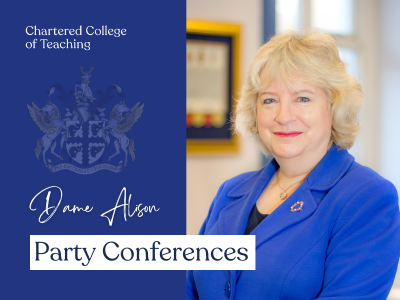This year, I spent some time at both the Labour and the Conservative Party Conferences. Labour’s Conference reflected the fact that they are the party in power – it was busy, focused and ‘business-like’ with lots of energy around collective problem-solving. Many of the fringe events were focused on the importance of communities, regional solutions and cross-sector collaboration. The Conservatives were much quieter. Sessions were more reflective – there’s a marked difference between planning for things that could happen soon and proposing ideas for a complex and uncertain future. They were also more grimly determined.
Conference speeches also give a flavour of priorities. At Labour, the Secretary of State spoke about the importance of education providing opportunities for every child and young person, of educating the people of the future not just the workers of the future. She promised that child poverty will be lower at the end of this parliament than it was at the beginning. The Shadow Secretary of State promised that the Conservatives would have stronger exclusion policies, more high quality places in pupil referral units, and automatic fines for pupil absence.
At both conferences, I joined roundtable discussions focused on the potential impact of AI on education, which were run by the Education Policy Institute (EPI). Both sessions were open-minded and forward-looking. Inevitably, the Labour roundtable focused on potential future policy and concerns about practical issues such as safeguarding. The Conservative session was much more ‘blue-sky’, with more attention paid to the involvement of employers and parents in a future Tory-world.
Dr Cat Scutt, Deputy CEO of the Chartered College of Teaching, ran a session with EPI discussing how to keep teachers in the profession. It was particularly lovely to be joined by Shuna Neave, Chartered Teacher, as part of the panel. They both spoke powerfully about the issues that affect teachers’ work, and the impact of high quality professional development on teacher agency and trust. The panel, which included Darren Paffey MP, Manny Botwe (ASCL past-President) and Sinead McBrearty CEO of Education Support, also talked about the importance of inclusive cultures, support and flexibility for creating schools where teachers can thrive and pupils will flourish. As the session was outside the secure zone, it was great to see a number of members of the College in the audience.
Party Conferences are strange events. They offer opportunities to engage in interesting and potentially influential conversations and to find common themes and shared ideas across the big issues of the day. The conversations and the people may be similar at each Conference, but there are distinct differences in mood and in emphasis between the different political parties. And there is an odd, ‘fenced-in’, almost ‘festival’ vibe, where political ‘celebrities’ can be glimpsed from afar. In fact, I spied Michael Gove, a former Secretary of State for Education, sitting casually amongst the audience in one of Bridget Phillipson’s fringe events. Everyone can find opportunities to listen and learn.





